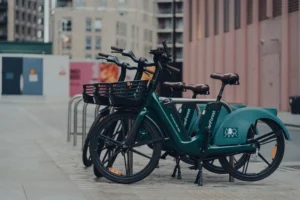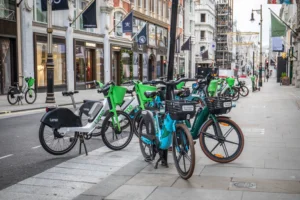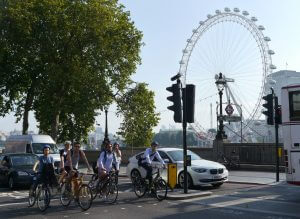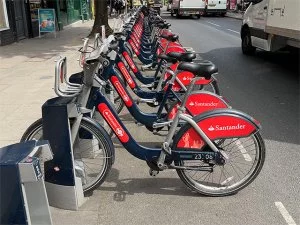The law around E-bikes and E-scooters explained
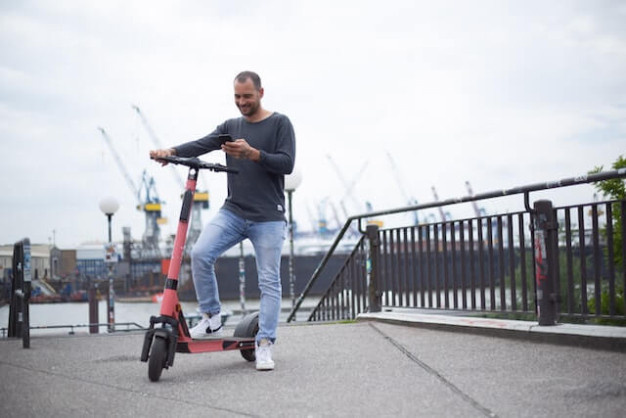
Contact
Table of Contents
E-bikes and e-scooters are the new rides on the block. To many, they are the micro-mobility revolution that will deliver low-carbon, cheap, urban travel. To others, they are cheating. Or dangerous. Or illegal.
Why are electric bikes legal but not scooters?
As with any new technology, micro-mobility devices offer opportunities and challenges, and lawmakers have the job of regulating them so that their obvious benefits can be enjoyed safely.
Why are electric bikes legal?
If an e-bike complies with the construction and use regulations, it is already allowed by law. The requirements are:
- It must have a maximum power output of 250 watts
- It must have a maximum powered speed of 15.5 mph (20 kph)
Find out how to make an E-scooter claim
It officially becomes an Electrically Assisted Pedal Cycle (EAPC) when these requirements are met. This gives it a special status, so it is not treated as a motor vehicle. Therefore, it is exempt from the road traffic acts that require insurance, helmets, tax and registration.
EAPCs are allowed on the roads and in cycle lanes (but not on pavements) and can be ridden by anyone aged 14 and over. As with bicycles, proficiency training and bike helmet use are recommended on safety grounds but are not mandatory. This is a light-touch legal framework, and e-bikes are essentially treated the same as bicycles. This makes sense – they are, in fact, the same as a normal bike, only the pedal power is enhanced by battery output within strict limits.
A small e-battery is better seen as encouraging those whom the prospect of cycling might otherwise daunt to venture onto the streets. This is especially so during the pandemic lockdown when alternative means of transport are even less appealing, and the roads are quieter than normal. An e-bike will smooth the hills and extend the range of the average cyclist so that commuting to work becomes an achievable target – at least for many, a realistic alternative to the tube, bus or car.
There is no evidence that e-bikes are more likely to be involved in cycle accidents – injuring the rider or anyone else – than normal bikes, so if they get more people on two wheels rather than four, it is hard to fault a bike that gives a bit more oompf for those who want it.
Head injuries are one of the most common injuries caused by bicycle accidents, accounting for around 40% of reported cycling injuries—these range from cuts and bruises to concussion, hairline fractures, severe brain damage, and fatalities. The most common type of head injury caused by cycling is concussion, which can cause dizziness, memory loss, temporary loss of brain function and speech control. The higher the speed of a cycling accident the more likely the head injury will be much more serious.
Why are electric scooters illegal?
An e-scooter is a slightly different animal. The law treats the e-scooter very differently, at least at present.
The electric scooter is a powered vehicle (technically a Personal Light Electric Vehicle). Therefore, unlike the e-bike, it is classed as a motor vehicle under road traffic legislation. However, it does not comply with the construction and use regulations (for instance, a registration plate and rear-facing lights) like other motor vehicles, so it is illegal on our roads.
Even if you were to have a compliant e-scooter, you would still have to comply with the rules requiring insurance, MOT, road tax and helmet to ride an e-scooter on the road legally. So, they are only currently allowed on private land (with the owner’s permission).
The penalty for use on a road is 6 penalty points and/or a £300 fine.
The annual casualties in Greater London report from Transport for London shows that serious injuries caused by ‘other’ vehicles, such as e-scooters, are on the rise, up to 56 from 10 in the previous year. Find out how to make an E-bike accident claim.
Legalising e-scooters
In the Spring of 2020, the government consulted on legalising e-scooters, and they indicated in the call for evidence that they were looking at regulating e-scooters so that they are treated the same as e-bikes. That is a low regulatory bar that sets a maximum speed limit (12.5 mph or 15.5 mph, or somewhere in between) and perhaps a maximum power output. There may be other construction requirements, such as having a handlebar (ruling out other forms of micro-mobility).
The government paper also sought views on whether to allow e-scooters on roads and cycle lanes (but not the pavement) and will need to consider what regulations to impose in relation to braking and lighting/reflectors; dimensions and ability to indicate; registration, licencing and age limits.
Governmental pilot scheme
Around the same time, it was announced that a 12-month pilot rental scheme for e-scooters would begin on 4 July 2020. From then on, local authorities could allow private e-scooter rental schemes within their area, subject to certain rules. The hope was that the change in transport use resulting from the pandemic lockdown would create an opportunity to encourage and roll out micro-mobility vehicles. The new scheme attracted headlines suggesting an e-scooter free-for-all, where all e-scooters became legal overnight. The reality was very different: from 4 July, the enabling regulations were put in place to allow rental schemes to be approved by councils, and at the time of writing, none have yet been publicised.
The rules under the scheme remain fairly tight. They will still be treated as motor vehicles during the trial. They will need insurance coverage (to be arranged by the hiring company) and a valid driving licence (full or provisional). E-scooters hired under an approved scheme will be allowed to ride on roads, cycle lanes, and tracks, but not on pavements. There will be no need to wear a helmet (but it is recommended).
The government intends to monitor the scheme monthly. The evaluation process will look at risk vs. benefit: safety outcomes from e-scooter users, public perception (including from other road users and people with disabilities); as well as take-up and popularity.
Experience in early adopter cities worldwide shows that differences in infrastructure and culture can create very different regimes: a 6 mph speed limit in Barcelona’s cycle lanes, compulsory insurance in Berlin and helmets in Kyoto. And Paris has just announced a crackdown to stop e-scooters littering the capital.
Can you ride a private electric scooter on the road?
The only electric scooters that can be ridden on public roads are those currently part of government-backed trials such as the one being carried out in 10 boroughs of London. Privately owned e-scooters can not be ridden on public roads. They can only be used on private land. This is because they don’t always have visible rear red lights, number plates or the ability to signal when turning left or right.
Can you ride an electric scooter if banned from driving?
If you are banned from driving, this also excludes you from riding electric scooters. To ride an e-scooter, you require a category Q entitlement on your driving license. The same rules apply to e-scooters as other vehicles within the Q category.
To speak with Stuart or another of our London lawyers, contact us at 020 7485 8811 or complete an online enquiry form.
Share this article
Contact us for expert advice or to start your claim.
Call us 020 7485 8811
Email us Send us an email and we’ll get back to you
Cycling News & InsightsVIEW ALL
- 27.10.2025
Calls for E-Bike Insurance Law Reform After Forest...
Forest E-Bike crash prompts calls for E-Bike insurance reform A cyclist who was eight hours from death after colliding with...
Read more - 15.10.2025
Faulty Lime Bikes Spark Wave of Legal Action
Bike rental company Lime is facing a wave of legal action after riders suffered serious injuries when their bikes fell...
Read more - 25.6.2025
Sam Collard speaks to BBC London on the...
In a recent interview with the BBC, Sam Collard, Partner and Head of Cycling Accident Claims at Osbornes Law, addressed...
Read more - 6.8.2024
Case Study: £25,000 Settlement for an E-Scooter Accident Claim
Pedestrian hit by an e-scooter rider claims £25,000 This case study highlights how Osbornes Law secured a £25,000 settlement for a client...
Read more - 25.7.2024
Cycling Claim Examples: Real Client Cases
Summary: Explore examples of real-life cycling accident cases handled by Osbornes specialist cycling team including the payouts clients have received...
Read more - 12.12.2023
Guide to Bicycle Accident Settlement Amounts
Bicycle accident claim payouts: How much could you receive? If you’ve been knocked off your bike or injured in...
Read more - 26.10.2023
Six-Figure Compensation for Victim of Reckless Scooter Driver
Siobhan McIvor, accredited Personal Injury Solicitor and Partner at Osbornes Law, has settled a case at a Settlement Meeting with...
Read more - 28.2.2023
Do you have to wear a bike helmet?
Should bike helmets be mandatory in the UK? Recently, Dan Walker was involved in a nasty collision with a motorist...
Read more - 16.9.2021
The law around E-bikes and E-scooters explained
E-bikes and e-scooters are the new rides on the block. To many, they are the micro-mobility revolution that will deliver...
Read more - 31.12.2020
Bike Boxes – what are the rules?
Cycle boxes at traffic lights I read a post recently on a London cycling forum in relation to some confusion...
Read more - 3.12.2019
Cycling accidents involving potholes
Cyclist Pothole Claims According to a recent article in the Telegraph there has been a 33% reduction in people cycling since...
Read more - 26.11.2019
Do I need insurance for cycling?
No legal requirement for cyclists to hold insurance There is no legal requirement for cyclists to hold insurance cover in...
Read more - 14.2.2019
Cyclists, Roundabouts and the Highway Code
The Highway Code is more than just a guide to how to pass your driving test. It is intended to...
Read more





